高中英语必修1《Uni 4 Earthquakes》课件(共41张PPT)
文档属性
| 名称 | 高中英语必修1《Uni 4 Earthquakes》课件(共41张PPT) |
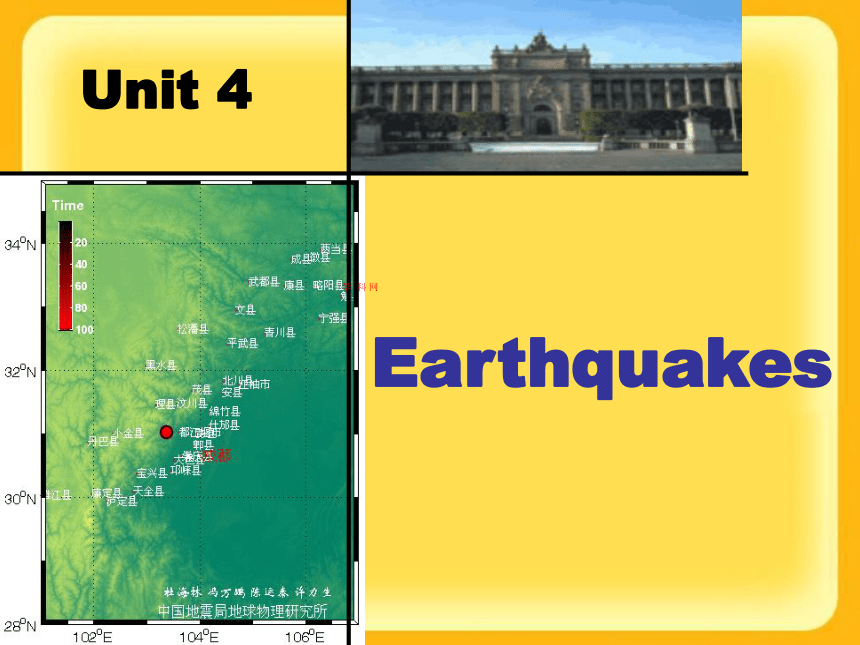
|
|
| 格式 | zip | ||
| 文件大小 | 2.5MB | ||
| 资源类型 | 教案 | ||
| 版本资源 | 人教版(新课程标准) | ||
| 科目 | 英语 | ||
| 更新时间 | 2016-04-22 00:00:00 | ||
图片预览

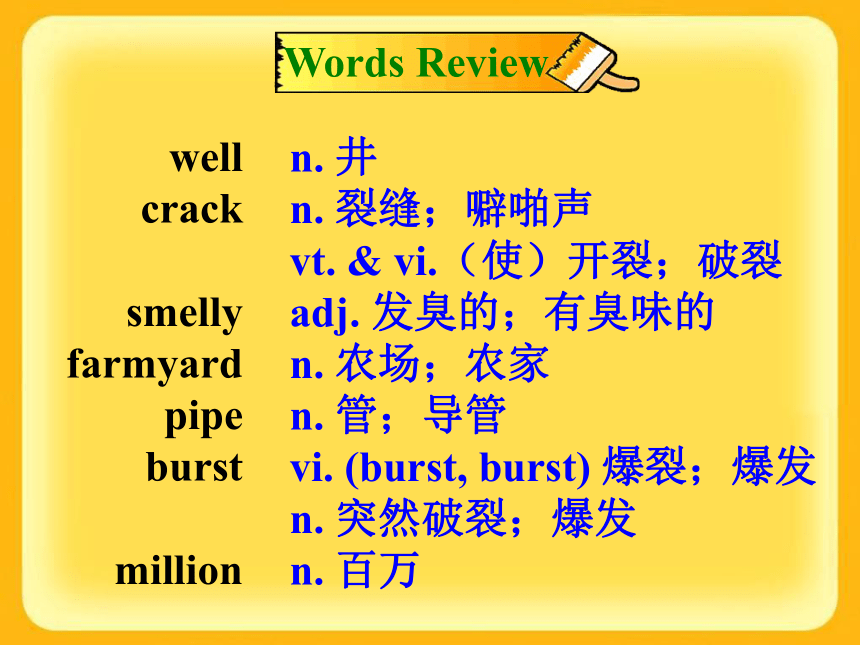
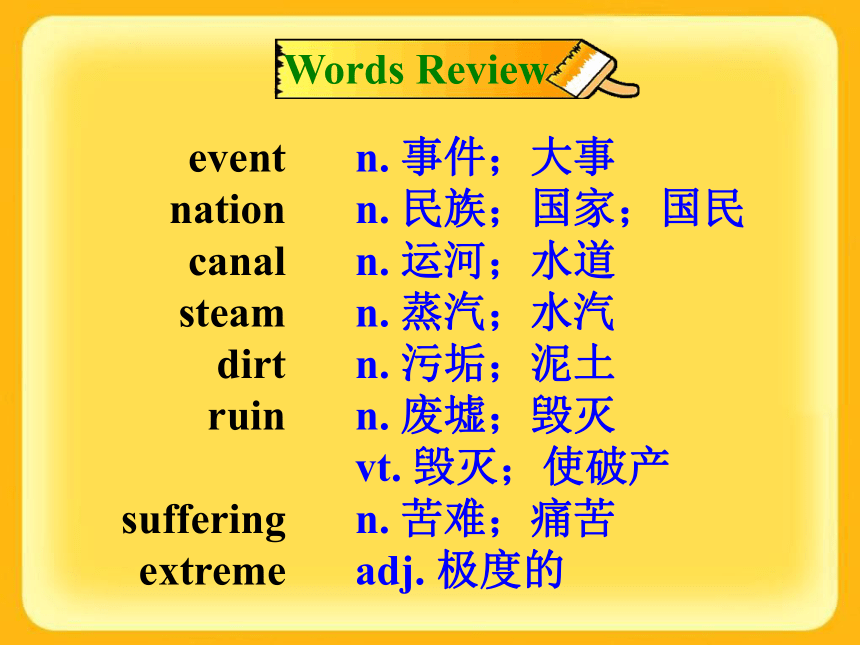
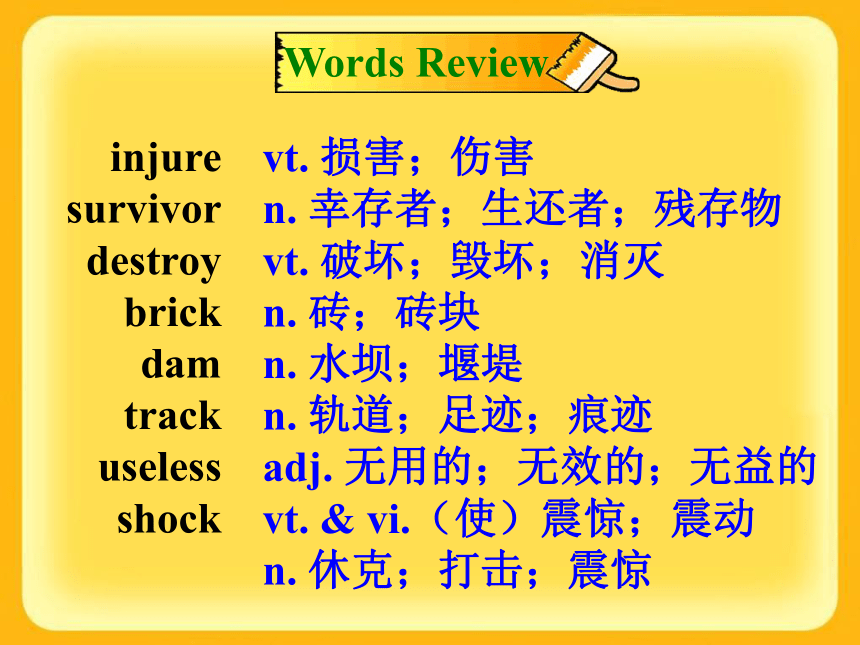
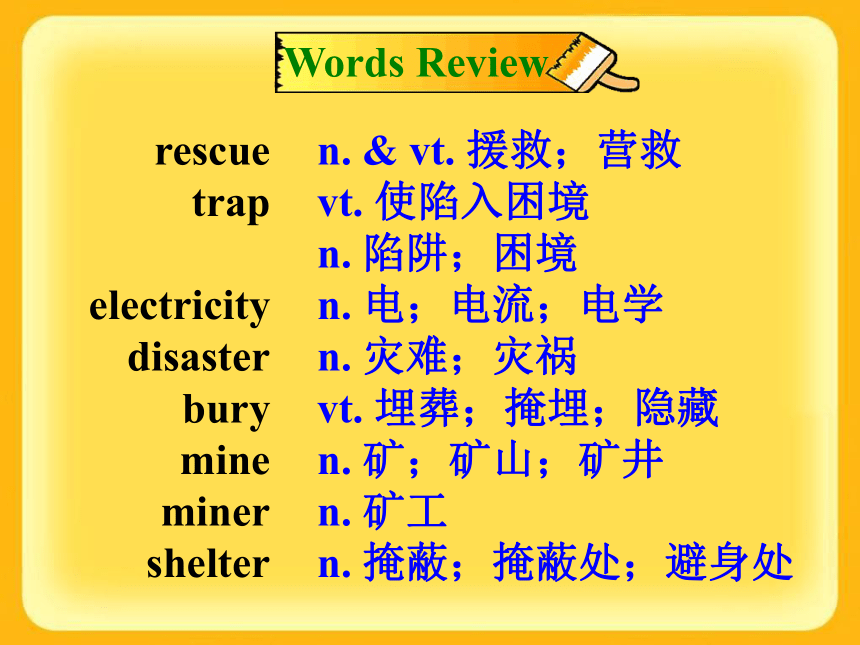
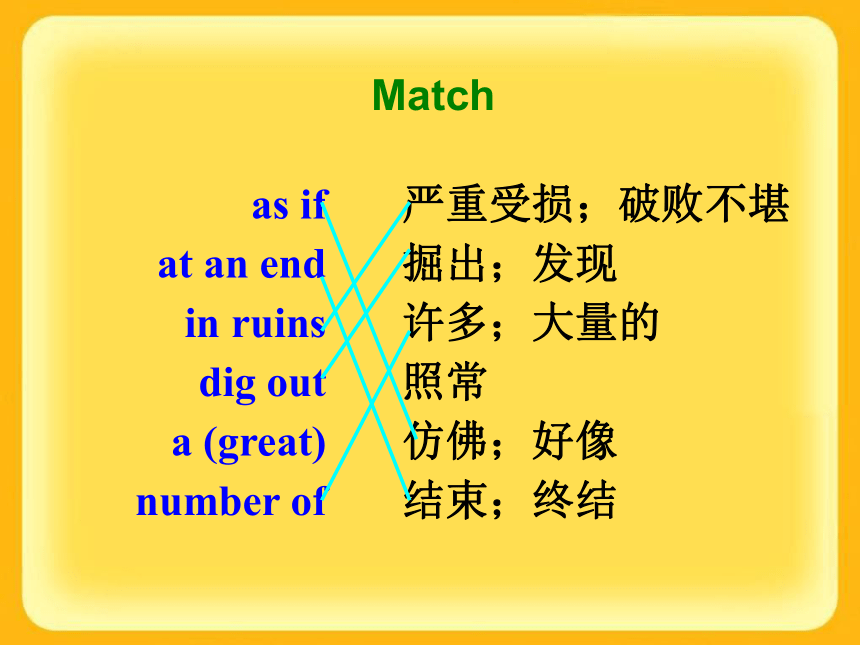
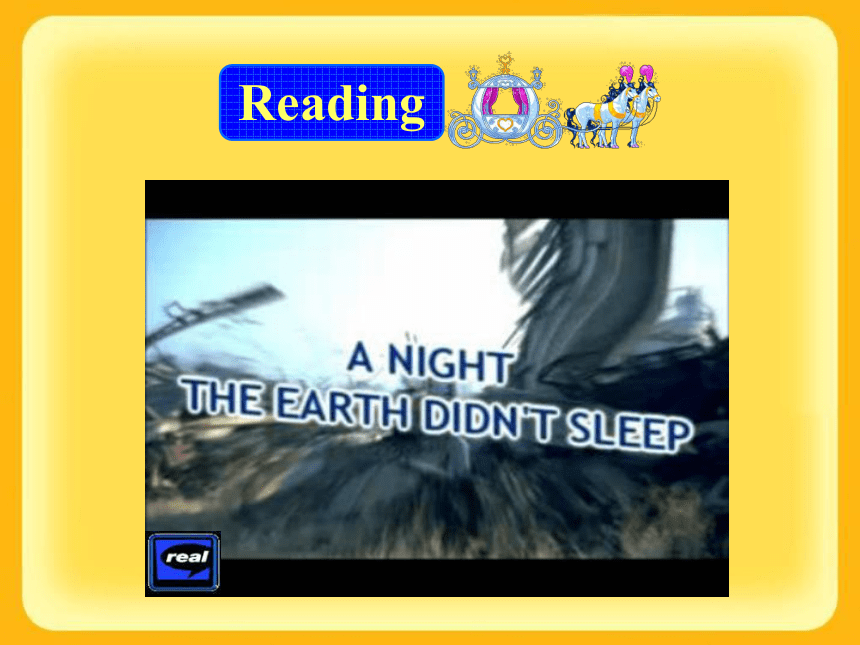
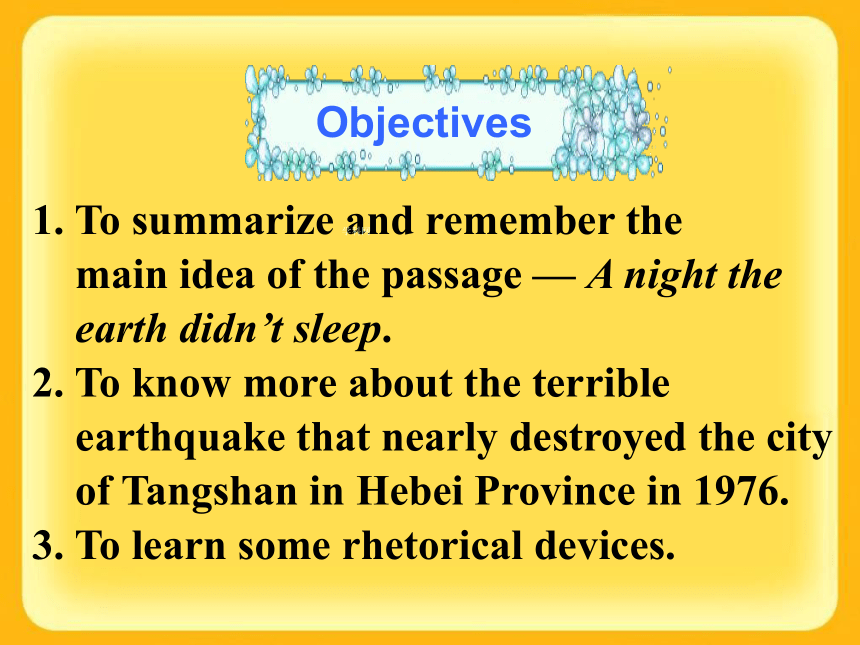

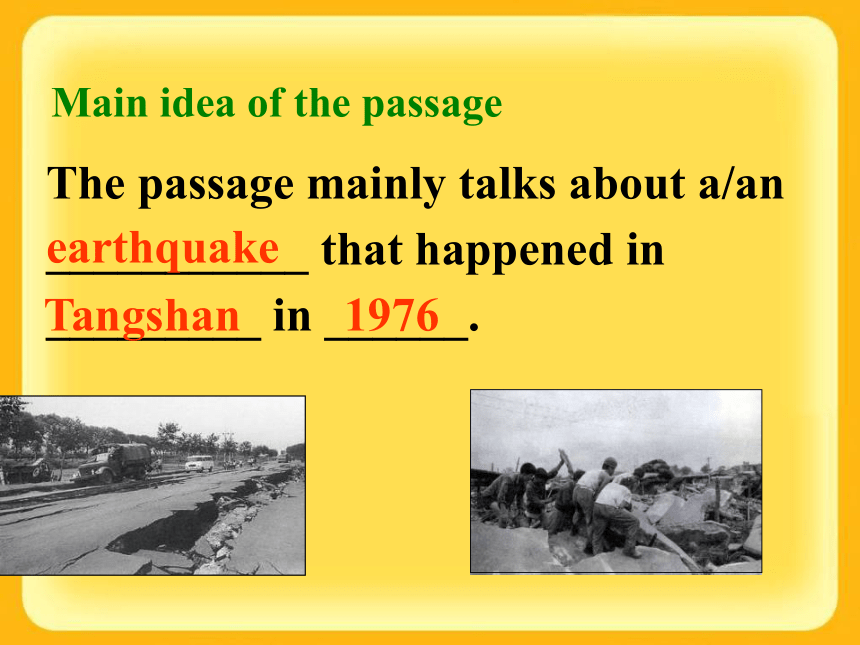
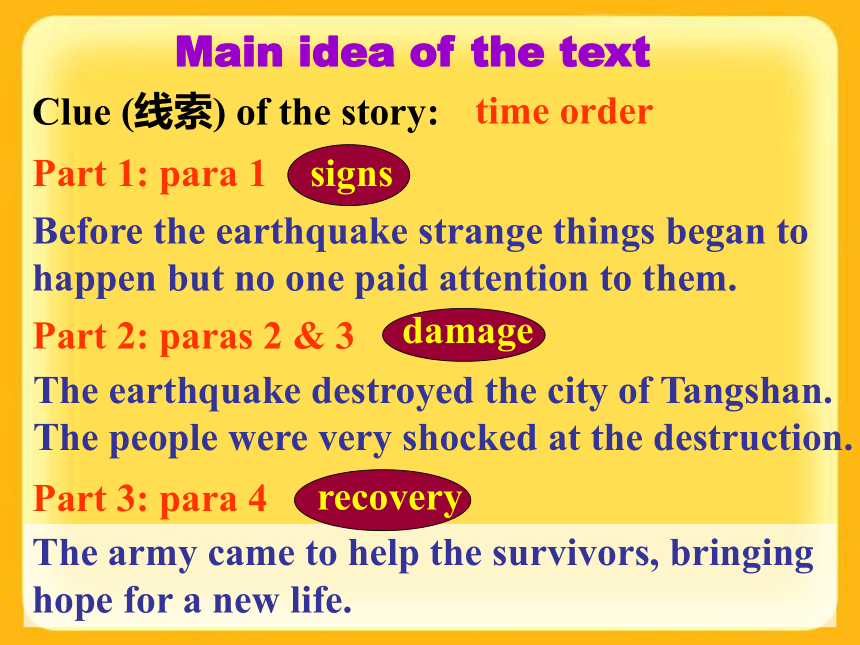

文档简介
课件40张PPT。Unit 4Earthquakes学 科 网Words Reviewwell
crack
smelly
farmyard
pipe
burst
millionn. 井
n. 裂缝;噼啪声
vt. & vi.(使)开裂;破裂
adj. 发臭的;有臭味的
n. 农场;农家
n. 管;导管
vi. (burst, burst) 爆裂;爆发
n. 突然破裂;爆发
n. 百万Words Reviewevent
nation
canal
steam
dirt
ruin
suffering
extremen. 事件;大事
n. 民族;国家;国民
n. 运河;水道
n. 蒸汽;水汽
n. 污垢;泥土
n. 废墟;毁灭
vt. 毁灭;使破产
n. 苦难;痛苦
adj. 极度的Words Reviewinjure
survivor
destroy
brick
dam
track
useless
shockvt. 损害;伤害
n. 幸存者;生还者;残存物
vt. 破坏;毁坏;消灭
n. 砖;砖块
n. 水坝;堰堤
n. 轨道;足迹;痕迹
adj. 无用的;无效的;无益的
vt. & vi.(使)震惊;震动
n. 休克;打击;震惊Words Reviewrescue
trap
electricity
disaster
bury
mine
miner
sheltern. & vt. 援救;营救
vt. 使陷入困境
n. 陷阱;困境
n. 电;电流;电学
n. 灾难;灾祸
vt. 埋葬;掩埋;隐藏
n. 矿;矿山;矿井
n. 矿工
n. 掩蔽;掩蔽处;避身处as if
at an end
in ruins
dig out
a (great) number of 严重受损;破败不堪
掘出;发现
许多;大量的
照常
仿佛;好像
结束;终结MatchReading1. To summarize and remember the
main idea of the passage — A night the
earth didn’t sleep.
2. To know more about the terrible
earthquake that nearly destroyed the city
of Tangshan in Hebei Province in 1976.
3. To learn some rhetorical devices. Objectives学科网Skimming for general ideaThe passage mainly talks about a/an
___________ that happened in
_________ in ______.earthquakeTangshan1976Main idea of the passageThe army came to help the survivors, bringing hope for a new life.Part 1: para 1Part 2: paras 2 & 3Part 3: para 4Main idea of the textBefore the earthquake strange things began to happen but no one paid attention to them. The earthquake destroyed the city of Tangshan. The people were very shocked at the destruction.Clue (线索) of the story: time orderScanning for specific information1. The earthquake began at ________.
A. 3:00 am, June 28, 1976
B. 3:00 am, July 28, 1976
C. 3:42 am, July 28, 1976
2. _________ people were killed or
injured in the quake.
A. Less than 400,000
B. More than 400,000
C. More than 150,000Choose the best answer.另附 word 文档链接3. Before the earthquake the following
happened EXCEPT that _______.
A. the water in the well rose and fell
B. the animals were too nervous to eat
C. bright lights appeared in the sky
D. people made good preparations for
the earthquake
4. How long did the earthquake last?
A. Ten seconds. B. Fifteen seconds.
C. Twenty seconds. D. Half a minute. 5. Which of the following didn’t happen
during the earthquake?
A. A huge crack appeared in the roads.
B. Bricks covered the whole ground.
C. The injured were sent to hospital
immediately.
D. The railway tracks became useless
pieces of steel.___ Brick buildings were destroyed.
___ The walls of the village wells had
cracks in them.
___ Shelters were put up for those with
no homes.
___ Roads got huge cracks.
___ The army helped the survivors.Number each of these things that happened during the Tangshan earthquake.31524One-third of the people died or were
injured during the earthquake.
2. Such a great number of people died
because the quake happened while they
were working.
3. All the hospitals had been destroyed.True or false4. Only supply of water and electricity
was cut off.
5. Almost everything in Tangshan was destroyed.
6. Before the earthquake there wasn’t
anything strange happening.
7. Workers rescued most of the 10,000
coal miners to the south of the city.A the army came
to help them.
B the quake
happened while
they were sleeping.
C they were nervous.
D dames and wells
were useless.
E they didn’t know
what the strange
events meant.1 The chickens didn’t
eat because
2 The people didn’t
worry because
3 Such a great number
of people died because
4 Water was needed
because
5 The people did not
lose hope becauseJoin the correct parts of the sentences.as if 仿佛; 好像;
at an end 结束; 终结Practice1. The bag weighed a ton.
这个包仿佛重达一吨。
2. 看来他好像不能按时到达了。
It looks as if he won’t arrive in time.
3. 战争结束了。
The war was at an end. 2. Bricks covered the ground like red
autumn leaves.
残砖就像秋天的红叶覆盖着大地。Rhetorical device: simile (明喻) What is simile?
A simile is a rhetorical figure expressing comparison or likeness that directly compares two objects through some connective word such as like, as etc.
Why use it?
To create a vivid image.Metaphor (暗喻) directly says something is something else.
For example: His beard was a lion’s mane.
Simile is a gentler form of metaphor which tends to use "as" or "like" to compare something to something else.
For example: His beard was like a lion's mane.simile VS metaphor3. Slowly, the city began to breathe again.
慢慢地,这座城市又开始出现了生机。Rhetorical device: personification (拟人)
The sentence means: The life in Tangshan began to return to normal. What is personification?
Giving human qualities to things.
Why use it?
To form a vivid image in the reader’s mind.Practice1. Her eyes twinkled like stars.
Simile
2. Rita heard the last piece of pie calling her name.
Personification
3. All the world is a stage.
Metaphor
4. I am so hungry I can eat a horse.
ExaggerationPoint out its rhetorical device. Discuss the question in groups. Group Work What shall we do if an earthquake happens?DiscussionDrop onto the ground and protect your head by putting your bag on your head.Ways on self-rescue Keep away from the power lines.Keep away from the signs.Keep away from the buildings.Hide in the corner of the house.Don’t hide under the furniture, but by the furniture.Life is beautiful.
We must love our lives.
In an earthquake
SPEED IS LIFE.RememberNow two minutes to test your spelling.Spelling Bee1. English-Chinese
well, pipe, million, event, nation, canal,
steam, dirt, suffering, brick, dam, track,
electricity, disaster, mine, miner, shelter
2. Chinese-English
爆裂,毁灭,极度的,损害,破坏,
震动,援救,无用的,掩埋,使陷入困境When finished, exchange your papers to see who does the best.I. Complete the passage with proper words, which will help you retell the text.Strange things appeared before the earth-
quake happened. The well walls had deep cracks. A ______ (smell) gas came out of them. Many animals were too nervous ______ (eat). Bright lights were seen in the sky. The water pipes cracked and burst. At 3:42 am _____ July 28, 1976, everything began to shake. _____ seemed as if the world was at an end. Steam burst from holes in the ground. Hard hills of rock became rivers of dirt. smellyto eaton ItSoon the whole city lay in _____ (ruin). The number of people who ___________ (kill) or injured reached more than 400,000. Later that afternoon, another big quake which was almost as strong as the first _____ shook Tangshan. Everyone in the city was shocked and wondered how long the disaster would last. _______ (luck), the army organized teams to dig out those ____ were trapped and to bury the dead. Workers built shelters for _________ (survive). Fresh water was taken to the city by train, truck and plane. Thanks to the army, the city began to breathe again.ruinswere killedoneLuckilywhosurvivorsFill in the blanks.
Before an earthquake
_____ heavy pictures and mirrors _____ from places where people sleep or sit.
_______ things like flashlight, radio, batteries and bottled water on hand. II. Task-based reading.MoveawayPrepareDuring an earthquake
Most injuries _____ when people move around.
_____ away from buildings, glass windows and doors.
After an earthquake
________ a battery-operated radio for emergency instructions and information. occurMoveListen toList out the measures that people can take when an earthquake happens.well, million, as if, extreme, injure, destroy, track, useless, shock, trap.2. 发挥想象,连词成文
(50-100字)。Homework3. Try to retell the text by using the key words below:
who (people of Tangshan/the army); where (Tangshan); how; when (For three days →
At about 3:00 am on July 28,
1976 → At 3:42 am on July
28, 1976 → Afternoon of
July 28, 1976 → Soon after
the quake).4. Read the articles in page 1 of Learning English. The more you read, the faster and better you’ll understand. When finished reading, write a summary in 100 words or so.
5. Read the following passage and copy it into your note-book. Pay attention to the coloured words.A powerful magnitude-8.2 earthquake struck off Chile's northern coast Tuesday night, causing landslides and setting off a small tsunami (海啸) that forced an evacuation (撤离) of coastal areas.
In the city of Arica, the mayor reported some minor injuries and said some homes made of adobe (土砖) were destroyed. The quake shook modern buildings in nearby Peru and in Bolivia's (玻利维亚) high altitude capital of La Paz (拉巴斯).
The US Geological (地质的) Survey initially (最初) reported the quake at 8.0, but later upgraded (升级) the magnitude. It said the quake struck 61 miles (99 kilometers) northwest of the Chilean city of Iquique (伊基克,智利城市) at 8:46 pm, hitting a region that has been rocked by numerous quakes over the past two weeks.
The quake was so strong that the shaking experienced in Bolivia's capital about 290 miles (470 kilometers) away was the equivalent of a 4.5-magnitude tremor, authorities there said.
At least eight strong aftershocks (余震) followed in the first few hours, including a 6.2 tremor. More aftershocks and even a larger quake could not be ruled out, said seismologist (地震学家) Mario Pardo at the University of Chile.
Some roads in northern Chile were blocked by landslides, causing traffic jams among people leaving the coast.
crack
smelly
farmyard
pipe
burst
millionn. 井
n. 裂缝;噼啪声
vt. & vi.(使)开裂;破裂
adj. 发臭的;有臭味的
n. 农场;农家
n. 管;导管
vi. (burst, burst) 爆裂;爆发
n. 突然破裂;爆发
n. 百万Words Reviewevent
nation
canal
steam
dirt
ruin
suffering
extremen. 事件;大事
n. 民族;国家;国民
n. 运河;水道
n. 蒸汽;水汽
n. 污垢;泥土
n. 废墟;毁灭
vt. 毁灭;使破产
n. 苦难;痛苦
adj. 极度的Words Reviewinjure
survivor
destroy
brick
dam
track
useless
shockvt. 损害;伤害
n. 幸存者;生还者;残存物
vt. 破坏;毁坏;消灭
n. 砖;砖块
n. 水坝;堰堤
n. 轨道;足迹;痕迹
adj. 无用的;无效的;无益的
vt. & vi.(使)震惊;震动
n. 休克;打击;震惊Words Reviewrescue
trap
electricity
disaster
bury
mine
miner
sheltern. & vt. 援救;营救
vt. 使陷入困境
n. 陷阱;困境
n. 电;电流;电学
n. 灾难;灾祸
vt. 埋葬;掩埋;隐藏
n. 矿;矿山;矿井
n. 矿工
n. 掩蔽;掩蔽处;避身处as if
at an end
in ruins
dig out
a (great) number of 严重受损;破败不堪
掘出;发现
许多;大量的
照常
仿佛;好像
结束;终结MatchReading1. To summarize and remember the
main idea of the passage — A night the
earth didn’t sleep.
2. To know more about the terrible
earthquake that nearly destroyed the city
of Tangshan in Hebei Province in 1976.
3. To learn some rhetorical devices. Objectives学科网Skimming for general ideaThe passage mainly talks about a/an
___________ that happened in
_________ in ______.earthquakeTangshan1976Main idea of the passageThe army came to help the survivors, bringing hope for a new life.Part 1: para 1Part 2: paras 2 & 3Part 3: para 4Main idea of the textBefore the earthquake strange things began to happen but no one paid attention to them. The earthquake destroyed the city of Tangshan. The people were very shocked at the destruction.Clue (线索) of the story: time orderScanning for specific information1. The earthquake began at ________.
A. 3:00 am, June 28, 1976
B. 3:00 am, July 28, 1976
C. 3:42 am, July 28, 1976
2. _________ people were killed or
injured in the quake.
A. Less than 400,000
B. More than 400,000
C. More than 150,000Choose the best answer.另附 word 文档链接3. Before the earthquake the following
happened EXCEPT that _______.
A. the water in the well rose and fell
B. the animals were too nervous to eat
C. bright lights appeared in the sky
D. people made good preparations for
the earthquake
4. How long did the earthquake last?
A. Ten seconds. B. Fifteen seconds.
C. Twenty seconds. D. Half a minute. 5. Which of the following didn’t happen
during the earthquake?
A. A huge crack appeared in the roads.
B. Bricks covered the whole ground.
C. The injured were sent to hospital
immediately.
D. The railway tracks became useless
pieces of steel.___ Brick buildings were destroyed.
___ The walls of the village wells had
cracks in them.
___ Shelters were put up for those with
no homes.
___ Roads got huge cracks.
___ The army helped the survivors.Number each of these things that happened during the Tangshan earthquake.31524One-third of the people died or were
injured during the earthquake.
2. Such a great number of people died
because the quake happened while they
were working.
3. All the hospitals had been destroyed.True or false4. Only supply of water and electricity
was cut off.
5. Almost everything in Tangshan was destroyed.
6. Before the earthquake there wasn’t
anything strange happening.
7. Workers rescued most of the 10,000
coal miners to the south of the city.A the army came
to help them.
B the quake
happened while
they were sleeping.
C they were nervous.
D dames and wells
were useless.
E they didn’t know
what the strange
events meant.1 The chickens didn’t
eat because
2 The people didn’t
worry because
3 Such a great number
of people died because
4 Water was needed
because
5 The people did not
lose hope becauseJoin the correct parts of the sentences.as if 仿佛; 好像;
at an end 结束; 终结Practice1. The bag weighed a ton.
这个包仿佛重达一吨。
2. 看来他好像不能按时到达了。
It looks as if he won’t arrive in time.
3. 战争结束了。
The war was at an end. 2. Bricks covered the ground like red
autumn leaves.
残砖就像秋天的红叶覆盖着大地。Rhetorical device: simile (明喻) What is simile?
A simile is a rhetorical figure expressing comparison or likeness that directly compares two objects through some connective word such as like, as etc.
Why use it?
To create a vivid image.Metaphor (暗喻) directly says something is something else.
For example: His beard was a lion’s mane.
Simile is a gentler form of metaphor which tends to use "as" or "like" to compare something to something else.
For example: His beard was like a lion's mane.simile VS metaphor3. Slowly, the city began to breathe again.
慢慢地,这座城市又开始出现了生机。Rhetorical device: personification (拟人)
The sentence means: The life in Tangshan began to return to normal. What is personification?
Giving human qualities to things.
Why use it?
To form a vivid image in the reader’s mind.Practice1. Her eyes twinkled like stars.
Simile
2. Rita heard the last piece of pie calling her name.
Personification
3. All the world is a stage.
Metaphor
4. I am so hungry I can eat a horse.
ExaggerationPoint out its rhetorical device. Discuss the question in groups. Group Work What shall we do if an earthquake happens?DiscussionDrop onto the ground and protect your head by putting your bag on your head.Ways on self-rescue Keep away from the power lines.Keep away from the signs.Keep away from the buildings.Hide in the corner of the house.Don’t hide under the furniture, but by the furniture.Life is beautiful.
We must love our lives.
In an earthquake
SPEED IS LIFE.RememberNow two minutes to test your spelling.Spelling Bee1. English-Chinese
well, pipe, million, event, nation, canal,
steam, dirt, suffering, brick, dam, track,
electricity, disaster, mine, miner, shelter
2. Chinese-English
爆裂,毁灭,极度的,损害,破坏,
震动,援救,无用的,掩埋,使陷入困境When finished, exchange your papers to see who does the best.I. Complete the passage with proper words, which will help you retell the text.Strange things appeared before the earth-
quake happened. The well walls had deep cracks. A ______ (smell) gas came out of them. Many animals were too nervous ______ (eat). Bright lights were seen in the sky. The water pipes cracked and burst. At 3:42 am _____ July 28, 1976, everything began to shake. _____ seemed as if the world was at an end. Steam burst from holes in the ground. Hard hills of rock became rivers of dirt. smellyto eaton ItSoon the whole city lay in _____ (ruin). The number of people who ___________ (kill) or injured reached more than 400,000. Later that afternoon, another big quake which was almost as strong as the first _____ shook Tangshan. Everyone in the city was shocked and wondered how long the disaster would last. _______ (luck), the army organized teams to dig out those ____ were trapped and to bury the dead. Workers built shelters for _________ (survive). Fresh water was taken to the city by train, truck and plane. Thanks to the army, the city began to breathe again.ruinswere killedoneLuckilywhosurvivorsFill in the blanks.
Before an earthquake
_____ heavy pictures and mirrors _____ from places where people sleep or sit.
_______ things like flashlight, radio, batteries and bottled water on hand. II. Task-based reading.MoveawayPrepareDuring an earthquake
Most injuries _____ when people move around.
_____ away from buildings, glass windows and doors.
After an earthquake
________ a battery-operated radio for emergency instructions and information. occurMoveListen toList out the measures that people can take when an earthquake happens.well, million, as if, extreme, injure, destroy, track, useless, shock, trap.2. 发挥想象,连词成文
(50-100字)。Homework3. Try to retell the text by using the key words below:
who (people of Tangshan/the army); where (Tangshan); how; when (For three days →
At about 3:00 am on July 28,
1976 → At 3:42 am on July
28, 1976 → Afternoon of
July 28, 1976 → Soon after
the quake).4. Read the articles in page 1 of Learning English. The more you read, the faster and better you’ll understand. When finished reading, write a summary in 100 words or so.
5. Read the following passage and copy it into your note-book. Pay attention to the coloured words.A powerful magnitude-8.2 earthquake struck off Chile's northern coast Tuesday night, causing landslides and setting off a small tsunami (海啸) that forced an evacuation (撤离) of coastal areas.
In the city of Arica, the mayor reported some minor injuries and said some homes made of adobe (土砖) were destroyed. The quake shook modern buildings in nearby Peru and in Bolivia's (玻利维亚) high altitude capital of La Paz (拉巴斯).
The US Geological (地质的) Survey initially (最初) reported the quake at 8.0, but later upgraded (升级) the magnitude. It said the quake struck 61 miles (99 kilometers) northwest of the Chilean city of Iquique (伊基克,智利城市) at 8:46 pm, hitting a region that has been rocked by numerous quakes over the past two weeks.
The quake was so strong that the shaking experienced in Bolivia's capital about 290 miles (470 kilometers) away was the equivalent of a 4.5-magnitude tremor, authorities there said.
At least eight strong aftershocks (余震) followed in the first few hours, including a 6.2 tremor. More aftershocks and even a larger quake could not be ruled out, said seismologist (地震学家) Mario Pardo at the University of Chile.
Some roads in northern Chile were blocked by landslides, causing traffic jams among people leaving the coast.
